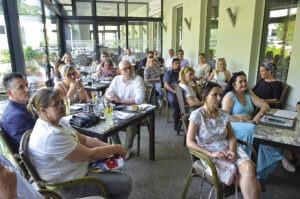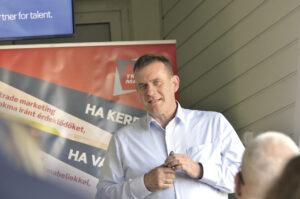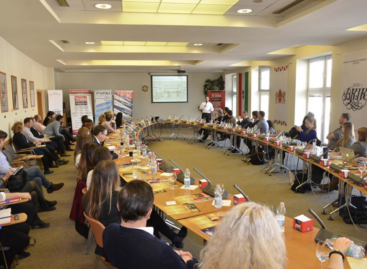A net, not a network: the art of networking
Trade Marketing Club organised its summer event entitled “The Art of Networking”, which featured two high-profile speakers, András Avidor, president of BNI Global Hungary and Sándor Baja, managing director of Randstad Hungary, Czech Republic, and Romania.
This article is available for reading in Trade magazin 2025/8-9.
Held on the terrace of the Anna Hotel, the event tried to seek answers to the question: what makes a business relationship authentic, effective and lasting?
Relationship capital = economic power
András Avidor was one day sitting in a café in Barcelona and he felt that something was missing from his life: the joy of making connections. This realisation set him on the path that ultimately led to the establishment of the BNI network in Hungary. Today he is the chairman of the organisation’s global board of directors. BNI is the world’s biggest business networking community, which has more than 320,000 members. András Avidor believes networking isn’t a matter of talent, but the result of daily decisions. It is built around five skills, all of which can be learned: intuition, courage, perseverance, method and value creation.

An introduction, a brief conversation, or a memorable question often becomes valuable years later—exactly when it’s needed most
The five skills
Networking is based on intuition: quick, instinctive decisions are often more effective than those that are carefully considered. Courage isn’t the absence of fear, but the ability to act calmly despite fear. Most networking situations fall outside our comfort zone. Perseverance is nothing more than acting with purpose, consistently, over and over again. The best relationship builders aren’t only instinctively good, but also regularly review their own performance and continuously refine their repertoire. As for value creation, it is the basis for real relationships. It is important to focus on the needs and goals of the other person. The expert added that sympathy and being present are competitive advantages – real relationship building begins when we are able to listen to someone else showing genuine interest and empathy.

András Avidor: Building connections isn’t a talent you’re born with—it’s a craft built around learnable skills, much like art
Not a connection, but a network
Networking isn’t the same as matchmaking, warned András Avidor. Real relationship building works according to network logic: we form relationships with each other by consciously looking for points of intersection, opportunities to contribute to each other’s goals. The network becomes strong when its members don’t compete with each other but work together to serve the same target group. For instance partners can connect in a way that when one of them gets a new client, the others also benefit through referrals and joint projects.

Sándor Baja believes that „a relationship is not a favour — it’s a safety net. And that’s worth more than a brand-new car”
Phone book vs. calls taken
A good relationship isn’t valuable when we are building it, but when it starts working – whether in business or in our private lives. According to Sándor Baja, the real test of networking isn’t how many names we have in our phone, but whether we can call them. At networking events breaks are the most important and a targeted presence is key. It is a good idea to read the list of participants in advance and ask the organiser for help with introductions. The three basic rules of networking are: be prepared, be present and do follow-up.
Give first and they will remember you
According to Sándor Baja, true trust isn’t born when we need it, but when we don’t even know we will need it. An introduction, a recommendation or agreeing to give a presentation often pays off years later. Long-lasting relationships aren’t based on measurable reciprocity, but on attention and value. Sándor Baja believes in instinctive, gesture-based relationship building. Those who are consistently present and give are remembered. A relationship is truly valuable if it not only moves you forward, but also brings others with it – but this requires a good leader who you can “cling to”.

Founders of TMK – Ágnes Csiby, Ildikó Kátai, Zsuzsanna Hermann – invited professionals to an afternoon where networking was not just a concept, but a vibrant, hands-on experienceg
Generations side by side – or against each other?
Generation Z’s attitude toward office presence, team building and networking is very different from that of older generations. Their socialisation is different: individualism, online communication and independent learning come naturally to the Covid generation. This difference causes generational tension, primarily among middle managers from Generations X and Y. Randstad’s expert warned that the key isn’t judgment, but adaptation. It is important to recognise that old patterns no longer work. There is no single right way to build relationships. Even with LinkedIn, there are two schools of thought: Sándor Baja only connects with people he has already met, while Zoltán Gazsi connects with everyone. For the former, the platform is a work tool, while for the latter it is a visibility channel. The important thing is to remain authentic and build value-based relationships.
Related news
Simpler operation, scaled performance – the role of the corporate network is becoming more valuable in the age of AI
🎧 Hallgasd a cikket: Lejátszás Szünet Folytatás Leállítás Nyelv: Auto…
Read more >Related news
Festival buzz at the 60th anniversary EuroShop trade fair
🎧 Hallgasd a cikket: Lejátszás Szünet Folytatás Leállítás Nyelv: Auto…
Read more >








